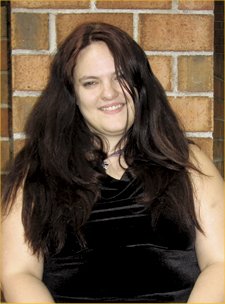Catherynne M. Valente: Playing in the Garden
Excerpts from the interview:
“The first book I ever read was a fantasy novel, The Neverending Story. My mother also made me read some very strange things, like Samuel Beckett when I was seven. She would read 'The Myth of Er' from Plato's Republic as a bedtime story to me when I was a little girl! My grandmother used to read me the Bible during the day, and The Arabian Nights and The Ramayana at night (a very folkloric upbringing). I have always inhaled books. I've read everything from trashy mysteries to Homer to Asimov, everything I could get my hands on. You can't know what is possible in literature unless you're walking through other people's books and finding out what they're capable of.
 “When I first started college I was going to study military history, but then I took a class on the Iliad and the Odyssey and the Aenead that taught them as poetry, not dry history. I fell in love with the Iliad -- I fell hard. We performed a 24-hour reading of the entire thing. There were 150 people, and we all took turns reading on stage with a microphone. The first 15 volumes were read in Greek (the first time I ever heard Greek in meter), and we had a bonfire. We roasted an entire goat on a spit, we had wine and drums... it was amazing! Except for the microphone, it was exactly as it would have been 2,500 years ago. One of the most moving experiences of my life. I knew I had to have that, and I never thought about Napoleon again.”
“When I first started college I was going to study military history, but then I took a class on the Iliad and the Odyssey and the Aenead that taught them as poetry, not dry history. I fell in love with the Iliad -- I fell hard. We performed a 24-hour reading of the entire thing. There were 150 people, and we all took turns reading on stage with a microphone. The first 15 volumes were read in Greek (the first time I ever heard Greek in meter), and we had a bonfire. We roasted an entire goat on a spit, we had wine and drums... it was amazing! Except for the microphone, it was exactly as it would have been 2,500 years ago. One of the most moving experiences of my life. I knew I had to have that, and I never thought about Napoleon again.”
*
“For me writing is a very physical act. I feel the book like my body, and when there's something 'off' I don't feel right until that thing is popped back into place. I write chronologically and I'm completely incapable of jumping around in a story, so I progress through my own story as a reader would. Since I write straight through and edit as I go, when I finish the book's in something like the fourth draft. (All the stylistic stuff that gets pointed out in reviews: that's just the way my brain works.) If I stop for a few days, I tend to start second-guessing myself and get crippled by anxiety, so I just have to barrel through.”
*
 “I'm happiest when I have multiple projects going, and I'm working on a couple of different books right now. I've been doing endless medieval research, translating documents on Prester John for a new novel called The Spindle of Necessity (based on a short story in Interfictions). There was this document that showed up in 1165 in Constantinople, a letter that describes this fantastic kingdom ruled by Prester John, who was a priest and a king somewhere in the general Indian area or Africa -- they were very vague. It's an amazing act of communal literature, because this letter gets added to over and over again. Everything that was ever wonderful in Earth's mythology is there in this one place. It has the first instance of the Fountain of Youth in literature.”
“I'm happiest when I have multiple projects going, and I'm working on a couple of different books right now. I've been doing endless medieval research, translating documents on Prester John for a new novel called The Spindle of Necessity (based on a short story in Interfictions). There was this document that showed up in 1165 in Constantinople, a letter that describes this fantastic kingdom ruled by Prester John, who was a priest and a king somewhere in the general Indian area or Africa -- they were very vague. It's an amazing act of communal literature, because this letter gets added to over and over again. Everything that was ever wonderful in Earth's mythology is there in this one place. It has the first instance of the Fountain of Youth in literature.”
*
“I don't think I would ever write a realist novel. I don't think there's any realist story (at the moment) which would hold my attention. I am interested in writing science fiction and branching out somewhat from fantasy, but if I do ever write SF I will write it the way I write fantasy. Fantasy is my heart and my love. It's a huge playground, the biggest genre there is, and it contains possibly all of the genres. And I just want to play in that garden for the rest of my life.”



